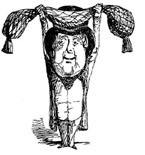
The Non Serviam of the Episcopal Church: Unsex Me!
GUEST COLUMN
Perhaps 2003 will be remembered as “Cheer the Queer” year. In this year Canada took the first steps toward the legalization of same-sex “marriages”; the U.S. Supreme Court revoked the states’ prerogative to outlaw sodomy; and in the midst of a long, hot summer, a different sort of heat was generated when the Episcopal Church, USA (ECUSA) elected and ratified its first openly and actively “gay” bishop, Gene Robinson. Meanwhile, the fields of academia and popular culture continued making strides in the direction of “normalizing” same-sex relationships. TV shows such as Queer Eye for the Straight Guy presented in-your-face homosexuality to the general public as something funny, cute, and hip. Among institutions of higher learning, “Queer Theory” and its various mutations increasingly became respectable courses, something very few academics were willing to challenge openly. When a few voices — such as those of Dr. Laura, Michael Medved, Senator Rick Santorum, and Francis Cardinal Arinze — actually did challenge the homosexualist establishment, they were vilified, with the mainstream media cheering on the vilifiers.
For two millennia — that is, until the most recent decades — all Christian churches, indeed all major religions, were united in agreement with the Bible’s very clear condemnation of homosexual acts. Even the non-celibate “gay” Episcopal Bishop Robinson recognizes that the Bible condemns sodomy, but that doesn’t matter to him. “Just simply to say that it goes against tradition and the teaching of church and Scripture,” he stated, “does not necessarily make it wrong.” If things don’t work out for Bishop Robinson in the Episcopal hierarchy, he may have a future as a shyster lawyer. One could easily imagine him telling a court: “Just simply to say my client was caught red-handed embezzling the money does not necessarily make what he did wrong.”
Sodomy was condemned as immoral for some five thousand years of Judeo-Christian history. So when did the departure from that tradition begin? The seeds were planted during the Protestant Reformation.
Henry VIII planted a time bomb that would eventually explode on a massive scale in the Anglican Communion. He created the Anglican Church because of his overweening desire for a male heir, even at the cost of his lawful marriage to Catherine of Aragon. His passion for a Tudor successor combined with a passion for his mistress, Anne Boleyn, gave birth not to a successful male heir, but to the Church of England. It was perhaps inevitable that this church, uprooted from Apostolic Succession and launched due to sinful passions, would sooner or later follow the trends of a sexually saturated society, such as our own.
In 1976 ECUSA formally ratified and accepted the irregular ordination of several priestesses, which had been carried out by a few individual bishops acting without formal approval. (American Catholics would later follow the same method of “winning through disobedience” by coercing Rome into accepting altar girls and various other liturgical irregularities.) Less than two decades after the creation of priestesses by ECUSA, the Anglican Church in England (sort of a first among equals in the worldwide Anglican Communion) debated and “studied” the issue, formally approving the practice in the early 1990s.
You May Also Enjoy
Neither Lewis nor Eliot was willing to condemn all uses of artificial contraception, yet both had obvious concerns about the moral implications of its use.
The view that one can find encouragement in the writings of the Catholic Newman for the reunion of Churches is a mighty myth.
November 1, 2015
All Saints’ Day (Roman Catholic calendar)
All Peoples’ Day/Samhain (Episcopalian…

